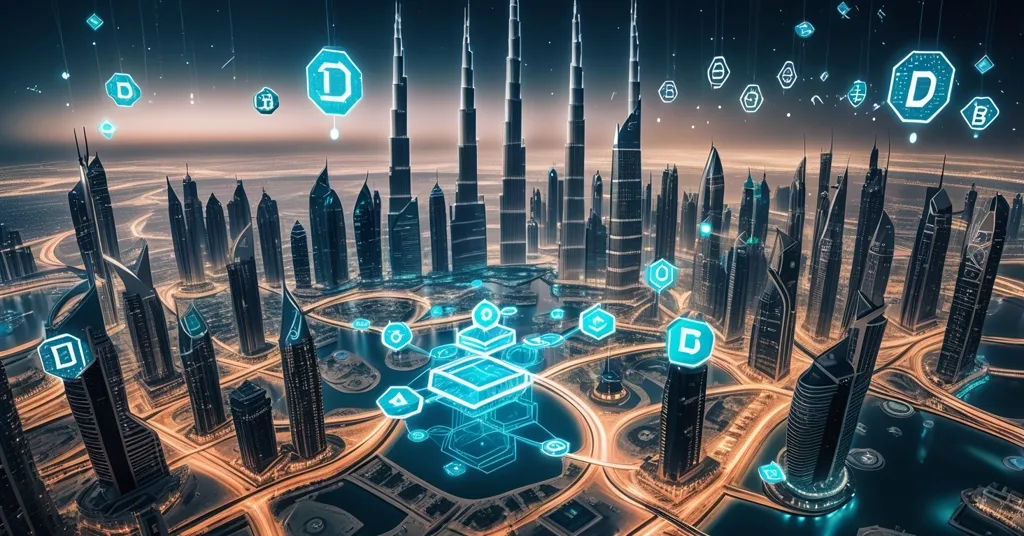Dubai Leads with DLD and VARA’s Real Estate Tokenization Pilot

Dubai Pioneers Real Estate Tokenization with DLD and VARA Partnership
Dubai’s real estate market is about to undergo a seismic shift thanks to a new partnership between the Dubai Land Department (DLD) and the Dubai Virtual Asset Regulatory Authority (VARA). This collaboration has launched a pilot project that aims to tokenize real estate, making property investment more accessible through fractional ownership.
- DLD and VARA partnership for real estate tokenization
- Aiming for $272 billion in real estate transactions by 2033
- First Middle East entity to tokenize property title deeds
- Collaboration with Dubai Future Foundation via SandBox Real Estate
The Dubai Real Estate Strategy 2033 has set an ambitious target to boost real estate transaction volume to $272 billion, and the Real Estate Innovation Initiative (REES) is at the core of this drive. DLD is pioneering this effort in the Middle East by being the first to tokenize property title deeds. For those new to the term, tokenization is the process of converting rights to an asset into a digital token on a blockchain, allowing for smaller, more manageable investments. Think of it like turning your favorite coffee shop into a stock you can buy a piece of without owning the whole thing.
This partnership extends beyond just DLD and VARA, bringing in the Dubai Future Foundation through its SandBox Real Estate platform. This collaboration is a testament to Dubai’s commitment to leveraging cutting-edge technologies to transform its economic landscape. Helal Almarri, a key figure in this project, underscored the significance of this initiative, stating,
“The agreement reflects the spirit of innovation and integration between Dubai’s government and digital sectors, noting that real estate tokenization represents a qualitative leap toward a more inclusive and transparent investment model.”
Marwan bin Ghalita, another official involved, highlighted the broader implications, saying,
“This step is important in driving real estate innovation, attracting technology companies, and improving the real estate industry’s technology.”
By tokenizing real estate, Dubai aims to increase liquidity and democratize access to investment opportunities, aligning with its vision to become a hub of innovation. Imagine a scenario where someone from halfway across the world could invest in a piece of Dubai’s skyline, all thanks to blockchain technology.
However, while the potential benefits are significant, we can’t ignore the challenges ahead. Regulatory hurdles, technological barriers, and market adoption rates could slow down this innovative leap. Yet, with the strong regulatory support from VARA and the Central Bank of the UAE, Dubai seems well-equipped to navigate these challenges. The involvement of these regulatory bodies is crucial for ensuring investor confidence and the success of the tokenization project.
This initiative is not just about making a quick buck on the blockchain; it’s part of a larger global trend where blockchain and tokenization are transforming the financial and real estate sectors. Dubai is not just following these trends but setting them, positioning itself as a leader in the global real estate and blockchain arenas. The Dubai Land Department and VARA to tokenize real estate for fractional investments is a prime example of this forward-thinking approach.
As we celebrate this move towards tokenization, let’s also keep our eyes open. The crypto space is notorious for its share of scammers and overhyped promises. While this initiative is promising, it must be scrutinized to ensure it lives up to its potential without falling into the traps of unrealistic expectations. In the world of blockchain, shining a light on the shadows is just as important as celebrating the bright lights of innovation. The benefits of real estate tokenization are clear, but vigilance is key.
And let’s not forget, this isn’t just about real estate; the implications could extend to property rights, legal frameworks, and even global investment patterns. As Dubai continues to push the boundaries, we’ll be watching closely to see how this unfolds. The Dubai Real Estate Tokenization wiki provides further insights into this transformative process.
Key Takeaways and Questions
- What is the main goal of the partnership between DLD and VARA?
The main goal is to enable fractional ownership of real estate through tokenization, aligning with the Dubai Real Estate Strategy 2033 to grow transaction volume to $272 billion.
- How does this initiative fit into Dubai’s broader economic strategy?
It aligns with Dubai’s vision to be a hub of innovation by leveraging blockchain technology to increase transparency, inclusivity, and liquidity in the real estate market.
- What makes DLD’s project significant in the Middle East?
DLD is the first real estate registration entity in the Middle East to implement tokenization of property title deeds, marking a pioneering move in the region.
- Who are the key collaborators in this project?
The key collaborators are DLD, VARA, and the Dubai Future Foundation through its SandBox Real Estate platform.
- What benefits does real estate tokenization aim to bring to investors?
It aims to allow a broader base of investors to participate in the real estate market by enabling fractional ownership, thereby increasing investment opportunities and market liquidity.



